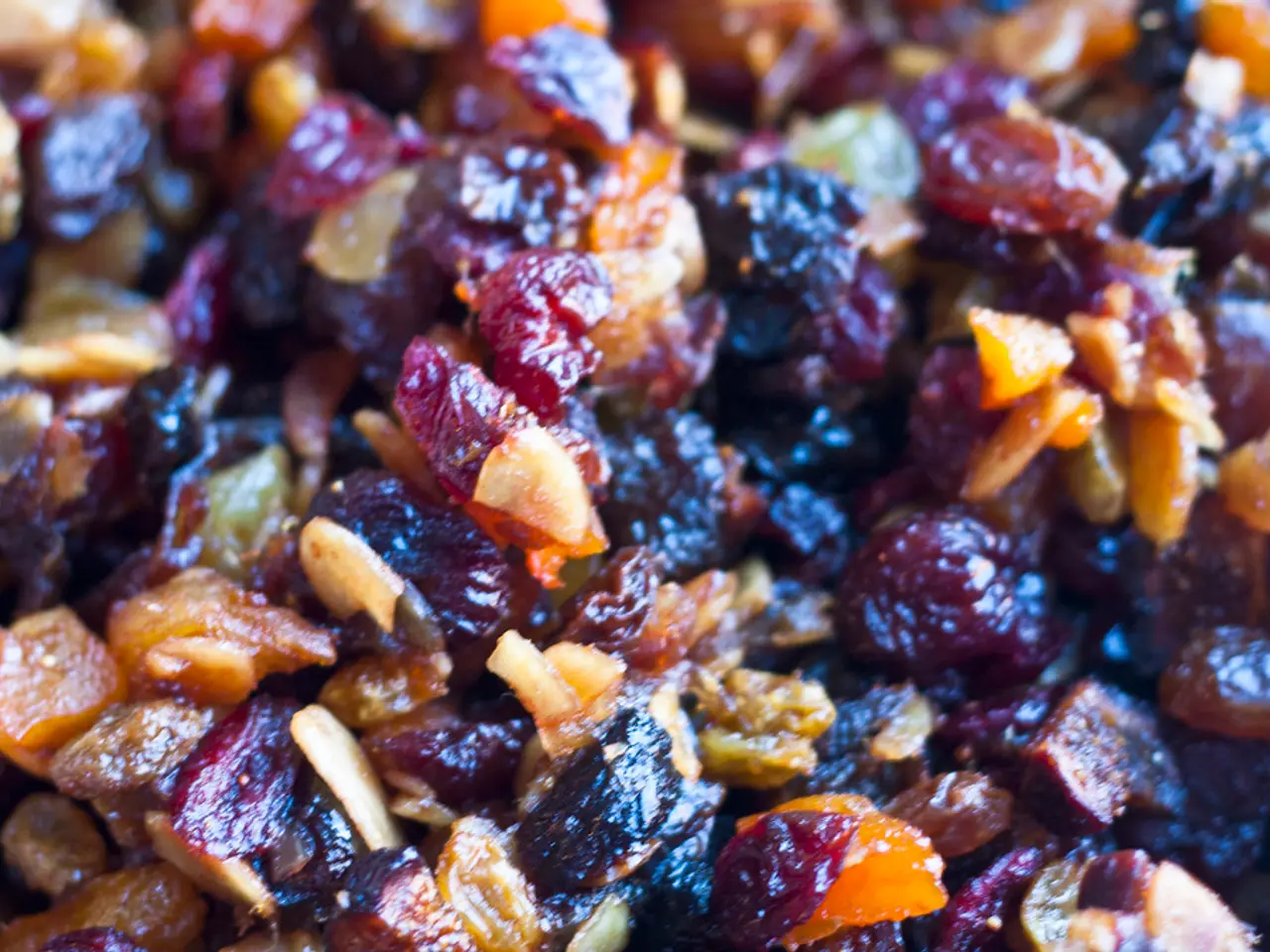Essential Vitamins to Increase and Their Sources:
In maintaining a balanced diet, it's crucial to ensure that our meals provide us with the necessary essential vitamins. Here's a guide to some vital vitamins, their food sources, and strategies for addressing potential deficiencies.
**Vitamin B12**
Rich sources of Vitamin B12 include fish, meat, poultry, eggs, and dairy products. For vegetarians and vegans, fortified foods can be a viable alternative.
**Folate (Folic Acid)**
Folate can be found in leafy greens, beans, peas, spinach, asparagus, broccoli, and legumes like lentils and chickpeas. Pregnant women should pay special attention to their folate intake to prevent neural tube defects.
**Vitamin D**
While the main source of Vitamin D isn't food, but the sun, fatty fish, fortified dairy products, and sunlight exposure can provide this essential vitamin. For vegetarians and vegans, fortified plant-based milk, mushrooms, and supplements can be good alternatives.
**Vitamin B6**
Chickpeas, beef liver, salmon, chicken breast, bananas, and potatoes are rich in Vitamin B6. This vitamin is crucial for brain function and the immune system.
**Vitamin A**
Sweet potatoes, carrots, dark leafy greens, liver, dairy products, and fortified plant-based milk are good sources of Vitamin A.
### Preventing or Addressing Vitamin Insufficiencies
1. **Dietary Planning**: A balanced diet that includes a variety of animal and plant-based foods is essential. 2. **Fortified Foods and Supplements**: Use fortified foods and supplements as necessary, especially for vegetarians and vegans. 3. **Consultation**: Regularly consult with healthcare professionals to identify and address deficiencies early. 4. **Cultural and Geographic Considerations**: Be aware of local dietary habits and the availability of nutrients in different regions. 5. **Sunlight Exposure**: Regular sunlight exposure can help maintain adequate Vitamin D levels.
### Key Strategies
- **Incorporate Variety**: Include a mix of whole grains, legumes, fruits, vegetables, nuts, and seeds in your diet. - **Fortification and Supplementation**: Use fortified foods and supplements when necessary. - **Healthcare Consultation**: Regularly consult with healthcare professionals to identify and address deficiencies early.
Remember, it can be difficult for some to get the daily recommended amount of folate through foods alone, and as people age, they may have less acid in their stomach to break down protein and release Vitamin B12 from food. Therefore, people over age 50 or those at risk for having less than sufficient amounts of Vitamin B12 should consider asking a doctor about supplements.
Vitamin B6 is part of nearly 200 biochemical reactions in the human body, and it's best known for its role in regulating sleep, appetite, and mood. It plays a key role in cognitive abilities and immune function and also helps you make red blood cells.
Vitamin A is important for vision, healthy skin, and immunity. Green vegetables and orange or yellow vegetables and fruits are good sources of beta-carotene, which is converted by your body into an active form of Vitamin A.
Increasing daily consumption of fruits, vegetables, and legumes can provide more folate. Conditions like Crohn's disease, the use of proton pump inhibitors, H2 blockers, and the diabetes drug metformin can interfere with Vitamin B12 absorption.
Getting enough Vitamin D is crucial for healthy bones and teeth, and it has been linked to preventing certain cancers and heart disease. Sources of Vitamin B12 include fish such as tuna, salmon, and trout, clams, meat, poultry, eggs, milk, milk products like cheese or nonfat plain Greek yogurt, and fortified soy milk. Many foods today are fortified with Vitamin D, including orange juice, milk, and breakfast cereals. Natural sources of Vitamin D include fatty fishes such as salmon, herring, tuna, sardines, and mushrooms, as well as whole eggs.
Folic acid is a synthetic form of folate used in supplements and fortified foods. It's particularly important for women to ingest during the first three weeks of pregnancy to prevent birth defects. For vegetarians and vegans, fortified foods can be good sources of Vitamin B12.
- In the realm of health-and-wellness and nutrition, it's important to incorporate a variety of foods in your diet to ensure you're getting essential vitamins like Vitamin B12, which is abundant in fish, meat, poultry, eggs, dairy products, and fortified foods for vegetarians and vegans.
- To maintain optimal health, a balanced diet that includes agricultural and livestock products, as well as the use of fortified foods and supplements when necessary, is key. For example, folate can be found in leafy greens and beans, while Vitamin D is more prevalent in sunlight and fatty fish, with alternatives like fortified plant-based milk for vegetarians and vegans.




